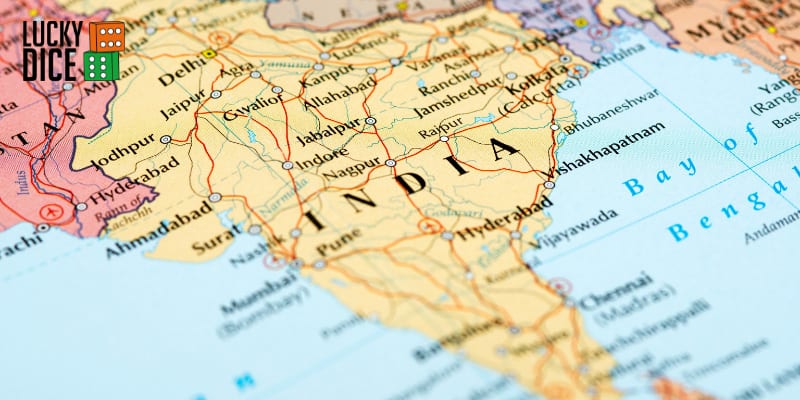Similar to other countries, gambling in India will depend on the different states as they are each provided with the rights to create and regulate gambling laws within their own areas. This can mean that gambling laws in India vary considerably as each state will have separate laws and different attitudes to gambling overall.

Goa, for example, does have legal casino operations. The only legal and operational casinos in India can be found in Daman, Sikkim, and Goa. The most common forms of gambling, such as organised betting, are heavily limited and regulated, with the only exceptions being a small handful of gambling activities such as horse racing and the lottery.
There have been a lot of calls for states and for the government to introduce more robust laws and regulations for gambling in India.
Unfortunately, there are still a lot of opportunities out there for people to take part in prohibited gambling and betting, and so more rigorous laws and regulations could certainly help prevent this. There is also a belief that when gambling activities become properly regulated it can have positive effects on public revenue. It is encouraged that everyone conducts further extensive research into the legality of gambling in India before they engage in such activities.
Gambling in India
Indian states are the ones who are permitted to create laws around gambling in the country, meaning each state will likely have different attitudes to one another. There can be very stern penalties for those who are caught breaking the law under the Public Gambling Act of 1867. This law has banned the operation or management of public gambling houses, and the penalty for breaking the law under this act will be a ₹200 fine or three months imprisonment. The Public Gambling Act of 1867 also forbids people from visiting places that offer gambling, with the punishment for breaking this law being a ₹100 fine or up to a single month of imprisonment.
Three States Offer Legal Gambling
Currently, there are only three states in India that offer casinos. These states are Daman, Sikkim, and Goa. Goa currently has one of the largest pools of casinos to select from, with six casinos being the typical land-based places of operation and a further four casinos are ‘floating’ casinos that can be found on the Mandovi River. The idea of floating casinos might seem a little strange initially, but there is a good reason for this. Under the Goa, Daman and Diu Public Gambling Act of 1976, casinos are only permitted to operate either on an offshore vessel or housed within five-star hotels, and they must have been given explicit permission by the government to operate.
The floating casinos on the Mandovi River in Goa include Casino Pride, Casino Pride 2, Casino Deltin Jaqk, and Casino Deltin Royale. The first two casinos are operated by the Pride Group and the last two fall under the control of the Deltin Group. Sikkim only has two casinos to choose from, and these are Casino Mahjong and Casino Sikkim.
Online
Online gambling has become a staple in plenty of other countries across the globe, however, it is still in its early stages in India. To date, Sikkim is the only state that has made attempts to acquire a licence to operate online gambling experiences, although this ultimately did not go ahead even though a lot of people were looking for an online experience.
The state of Sikkim does have a service that allows people to buy Indian lottery tickets online, and it has been reported that this service can be accessed by players all over India. It is still not entirely certain whether other states will follow in the footsteps of Sikkim, and only time will tell.
Under the Information Technology Act of 2000, certain cyber activities are regulated. Although in relation to online gambling, the act does not make any reference to ‘betting’ or ‘gambling’. This issue has since been left for the Courts to interpret, although it is reported that the Courts refuse to comment or even examine it.
It is prohibited and restricted for Indian casinos and gambling outlets to actively promote and have their own online gambling sites, whether this be casino games, betting on sporting events, or even bingo.
However, its widely known that other gambling operators that are not based in India, also known as offshore operators, are allowed to offer a long list of online casino services to cater for the Indian public.
States have Banned Gambling Online
A big thing to take into consideration is that the Indian states of Telangana and Andhra Pradesh have since banned all forms of online gambling since January 2020. If anyone is found to be breaking this law then they could receive a punishment of up to a year imprisonment or a set fine. Online gambling is also heavily prohibited in Maharashtra through the Bombay Wager Act.
Legalisation
Illegal gambling is still plaguing the country and is a continuing problem that needs to be addressed despite the proactive legislation that is already trying to prohibit illegal gambling. It is claimed by other outlets that the gambling market in India makes up a hefty sum of $60 billion (USD), where at least half of this sum is made illegally. There are still calls for the states and for the government overall to issue proper regulation and introduce legal gambling in India.
The key national law that prohibits the operation and management of establishments running gambling activities for the public is the Public Gambling Act of 1867. Readers should also bear in mind the Prize Competition Act of 1955, which restricts the awarding of prizes to winners of gambling activities. Under this Act, prizes being offered to the public that is in excess of ₹1,000, be it from solving a crossword, word-game, or other types of games where a prize is offered, are banned.













